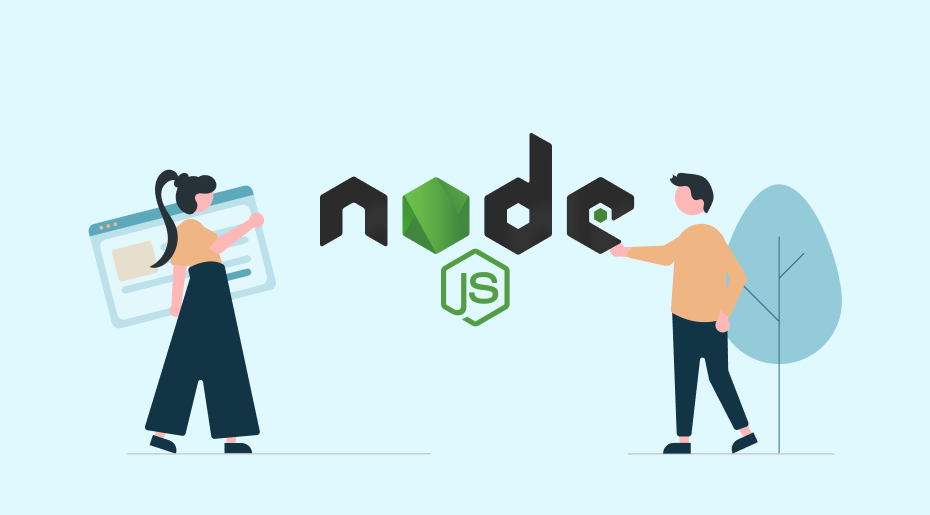
Introduction to NodeJS?
What is NodeJS?
Node.js; the back-end, cross-platform, and open-source JavaScript runtime environment. Node.js is a free and open-source server environment that can run on different platforms like Mac OS X, Unix, Linux, Windows, etc. It uses JavaScript on the server and is a runtime environment. Developers use Node.js to add, delete, or manipulate data in the databases, collect form data, and generate the dynamic page content. Further, Node.js can perform different functions on servers like closing, opening, creating, reading, writing, or deleting multiple files
Node.js is a popular, lightweight web framework for beginners, and it is used by many big companies like Netflix and Uber. Node.js is an important tool for any JavaScript developer to understand. So, today, we’ll introduce you to Node.js and show you how to get started with a project.

Use of NodeJS
Since we have outlined the basic concepts of Node.js, let’s see how they translate into the practical aspects. We will try to determine when to use Node.js and what is Node.js used for in web development in order to achieve the best application performance.
- Real-time applications. As we have found that Node.js can ensure great speed and performance, one of the textbook Node.js use cases is real-time messaging, or chatting. The environment can support heavy traffic of multiple short messages, or chatrooms when messages are displayed to many users at the same time
- Data streaming applications. The term “streaming” means exactly that – sending large amounts of data in smaller packages instead of a single batch. This ability is especially critical for audio or video streaming applications. Node.js is perfectly suited for this task with built-in modules supporting data streaming and allowing to create both readable and writable data streams. If we add that Netflix, a global media service provider, uses Node.js, you may get the idea of how powerful this environment is.
- Collaborative tools. This Node.js use case example is also related to its ability to process real-time flows. You should have heard of Trello, a project management application that is rather popular with software development companies.
- IoT applications.The synergy of js IoT is the best possible for implementing IoT development projects.
First, Node js is fast and powerful, and therefore capable of handling large data flows. Second, you can easily integrate Node.js with IoT protocols (the integration with MQTT and WebSockets can be a good example).
Features of NodeJS
Node JS comes with a number of notable features, some of them are as follows.
1. Facilitate Quick Deployment
Node JS can help speed up the pace of development for all web apps and web platforms. Most organizations and the developers working for them today require quick operations so that they are able to meet deadlines and can provide the kind of quality that is expected from them in time.
2. Scalable
Node JS is highly scalable in nature and can be used as you grow in size and stature. Node JS has the ability to enable split applications so that organizations can present target audiences with different versions of the same application. This scalability gives a number of individuals and developers the confidence they need to put their trust on Node JS.
3. Active Community
Node JS comes with an active community with open-source solutions. The growing popularity of the platform goes to suggest that the community is developing with time and that Node JS is opening new doors. Node JS community members interact on GitHub, Stack Overflow and Reddit. You can get in touch on these platforms.
4. Cross Platform Usability
Node JS can easily be used across platforms such as Windows, Linux, Unix, Mac OS X and others. You can also use it on mobile operating systems. The platform can be bundled together with other packages to make an entirely self-reliant system
Why NodeJs is Popular?
Nowadays, most corporate organizations worldwide are opting for Node.JS to create their unique and game-changing applications. It seems that Node.JS has something to offer everyone, including Trello, PayPal, Walmart, and even NASA. Now, you may wonder why Node JS is the one. So, let us discuss the reasons why Node.JS is so popular.
1. Easy to maintain and modify
Most built applications turn out to be less adaptive over time as new needs are fed. So, they may start creaking under that stress. However, developing services with Node.JS is a lot easier because, with this, a collection of small applications can be built instead of a large, single application. Thus, it can be modified or maintained with ease without changing anything deep inside the code-base.
2. It simplifies developers’ work
With Node JS, software developers don’t have to keep reinventing the wheel because they can simply download common features in the form of smaller open-source software modules using the Node Package Manager, known as npm.
3. It is really fast
JS is mainly a runtime of JavaScript that is powered by V8, created by Google to use in Chrome. This V8 has the power to execute and compile JavaScript at a great speed, mainly because it can compile JavaScript into a machine code that is native. Moreover, Node.JS has an amazing event loop, which is a single thread and can perform all the operations of I/O in an asynchronous manner
